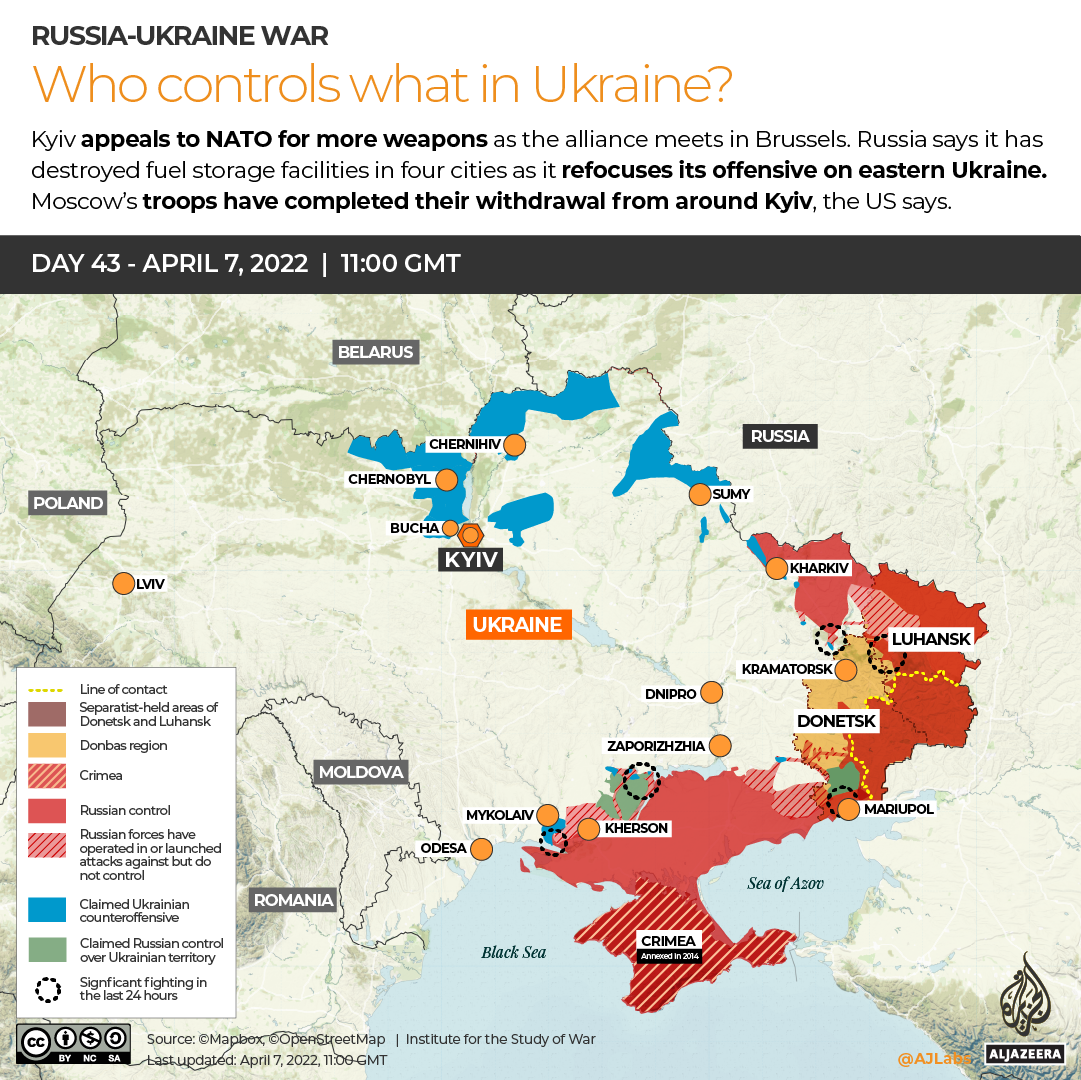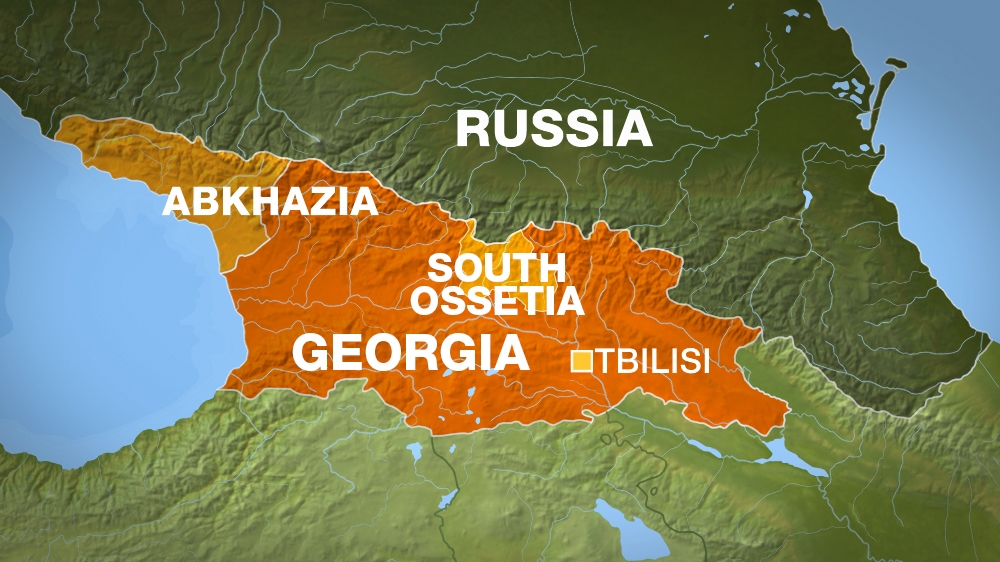
Ukraine’s eastern regions of Kharkiv, Donetsk and Luhansk are seeing the worst of the fighting after Russian forces withdrew from around the capital, Kyiv.
Ukrainian President Volodymyr Zelenskyy has addressed Russian citizens saying now is the time for them to decide whether they are for war or peace.
“Everyone in Russia who will not demand an end to this shameful war and the withdrawal of Russian troops from Ukraine has no future,” he said in an address.
Meanwhile, the US government has announced new measures against Russia, including sanctions on Russian President Vladimir Putin’s two adult daughters and Russia’s Sberbank, and a ban on Americans investing in Russia.
Here, Al Jazeera looks at the major events that marked the six week of the war in Ukraine:
March 30:
Kyiv’s Mayor Vitali Klitschko says Russian shelling of the capital has intensified following a Russian pledge to redeploy forces to the eastern Donbas region.
Residents in the Kyiv suburb of Irpin hear shelling and explosions.

The Kremlin deliberates on written terms of peace submitted by Ukraine the previous day in Istanbul.
“These proposals will be considered in the near future, reported to the president, and our response will be given,” says Moscow’s chief negotiator, Vladimir Medinsky.
March 31:
Putin is being misled by advisers too afraid to tell him the truth about the war, the White House says.
A convoy of 45 buses sets out from the western Ukrainian city of Lviv under the International Committee of the Red Cross (ICRC), to evacuate civilians from the besieged town of Mariupol.
Russian troops force the convoy to turn around and seize 14 tonnes of food and medical supplies meant for the city’s 100,000 remaining residents.
Putin decrees that “unfriendly” buyers of Russian gas – meaning countries that have imposed sanctions on Russia for its war in Ukraine – must pay in roubles for a third of that gas. The move is considered an attempt to bolster the currency.
Ukrainian forces are accused of attacking a fuel depot in Russia. Two helicopters are filmed firing missiles at the depot in Belgorod, about 30km (18.6 miles) from the Ukrainian border. Ukraine does not confirm the attack.
Ukraine’s atomic energy authority, Energoatom, says Russian troops have departed the Chernobyl nuclear plant and formally handed over control to Ukrainian authorities.
It says Russian soldiers received “significant doses” of radiation after digging trenches in contaminated soil in the forest surrounding the plant, which was the scene of a nuclear meltdown in 1986.

Georgia’s Moscow-backed breakaway region of South Ossetia says it will take steps to officially become part of the neighbouring Russian Federation.
“We will take the relevant legislative steps shortly,” says separatist leader Anatoly Bibilov. “The Republic of South Ossetia will be part of its historic homeland – Russia.”
Russia recognised South Ossetia as an independent state after it fought a brief war with Georgia in 2008. Russia has promised South Ossetia’s people citizenship and has garrisoned the region.
April 1
The governor of Ukraine’s southern port of Odesa says air defences thwart an attempted attack on “critical infrastructure facilities, the destruction of which could be dangerous for the civilian population”.
However, three Russian missiles are reported to have struck an oil refinery on the city’s outskirts.
During a virtual summit, Chinese and European Union leaders agree that Russia is endangering global peace and the global economy through its war in Ukraine, but disagree on how to end it.
European Council President Charles Michel and European Commission President Ursula von der Leyen call on China not to try to help Russia circumvent sanctions.
“Any attempts to circumvent sanctions or provide aid to Russia would prolong the war,” Michel says.
Chinese Premier Li Keqiang says Beijing will push for peace in “its own way”. Chinese President Xi Jinping says he hopes the EU will treat China “independently”, an acknowledgment of Europe’s strong political unity with the United States over Ukraine.

An Al Jazeera report reveals that Russia is using proxy groups in Syria to recruit fighters for Ukraine.
The groups are apparently coordinated through the Wagner Group, a mercenary fighting force close to the Kremlin. Syrian sources say at least two calls have been made for fighters.
Putin announced in March he will approve up to 16,000 fighters from the Middle East for deployment in the Donbas.
Meanwhile, the Czech foreign ministry publishes an open letter inviting Russian diplomats to defect.
“We implore those of you who have a conscience and who maintain the capacity to recognise evil: take yourselves out of this circle of accomplices … please, leave this sinking ship, which only attracts the wrath of freedom-loving people around the world,” the letter says.
April 2
As Russian troops withdraw from Bucha, a town northwest of Kyiv, dozens of corpses in civilian clothes are found on the streets.
Bucha’s Deputy Mayor Taras Sapravskyi says there are 300 corpses, of which 50 have been summarily executed.
Russia’s defence and foreign ministries say the alleged war crimes are staged by Ukrainian authorities and constitute a “provocation”.
A New York Times investigation comparing a film shot on April 1 and satellite images taken during March finds that many of the corpses appear in their present positions between March 9-11, when Russian forces entered Bucha, and March 20-21.

Some corpses are next to what look like impact craters. Others appear to have been shot to the head.
Eye witnesses to the Russian incursion in Bucha tell Al Jazeera the civilians have been shot dead by Russian troops.
Mayor Anatoly Fedoruk says 280 bodies have been buried in a mass grave in Bucha.
Ukraine’s prosecutor general says the bodies of 410 civilians have been removed from Bucha and other towns surrounding Kyiv.
April 3
Human Rights Watch says it has verified and documented war crimes by Russian occupying forces in the areas of Kyiv, Kharkiv and Chernihiv, in northern Ukraine.
Reuters reporters find a 15m-long trench in the vicinity of the Church of St Andrew in Bucha, which had begun to be used as a mass grave.

Elsewhere in the town, a second mass grave is found overflowing with bodies.
Satellite images show that work on the St Andrew trench started on March 10, when Russian forces had just moved into the town.
Local residents told reporters the dead lying on the streets of Bucha were their civilian neighbours and had been killed by Russian forces.
April 4
US President Joe Biden calls for Putin to stand a war crimes tribunal for the alleged Russian killings of civilians in Bucha.
“We have to gather all the detail” for a trial, he says.
Jake Sullivan, US national security adviser, says the killings were part of a premeditated plan to imprison or kill dissidents.
“We don’t believe this is just a random accident … we believe this was part of the plan,” he says.
Kremlin spokesman Dmitry Peskov dismisses the evidence of apparent Russian atrocities in Buch as “video forgery and various fakes”.
He says Russia will attempt to hold a UN Security Council discussion about what Russia calls “Ukrainian provocations” in Bucha.
April 5
The UN International Organisation for Migration says the number of internally displaced people in Ukraine has reached 7.1 million, a 10 percent increase since March 16.
Al Jazeera uncovers more testimony from Bucha residents saying they have been tortured and their lives threatened by Russian soldiers.







